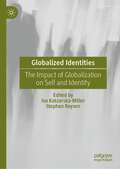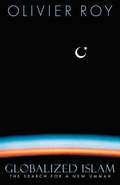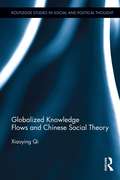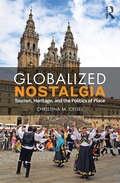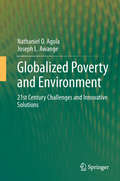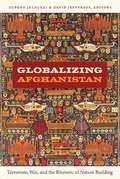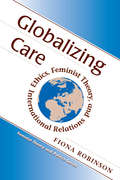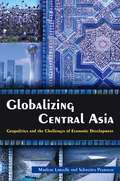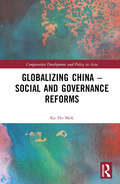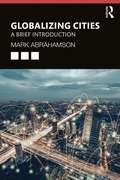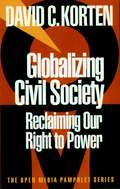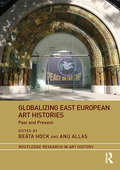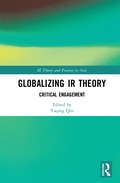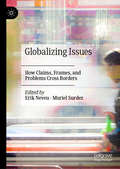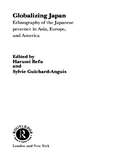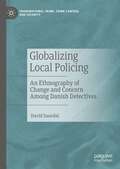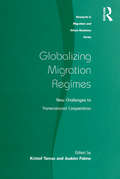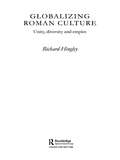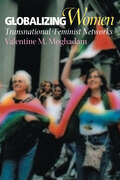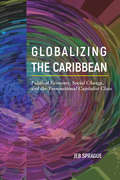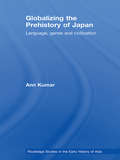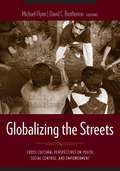- Table View
- List View
Globalized Identities: The Impact of Globalization on Self and Identity
by Iva Katzarska-Miller Stephen ReysenThis book explores the impact of globalization on self and identity from multidisciplinary perspectives. Chapters cover a variety of topics including the impact of cultural inertia on intergroup relations, global consumer identity, radicalization, evolving national identities, young people’s negotiations of different cultural identities, the emergence of all inclusive global identities, and the impact of global citizenship education on global identity. This collection will be of value to scholars and students from across the social sciences.
Globalized Islam: The Search for a New Ummah
by Olivier RoyCommentary on the Culture and its value.
Globalized Knowledge Flows and Chinese Social Theory: Globalized Knowledge Flows And Chinese Social Theory (Routledge Studies in Social and Political Thought #83)
by Xiaoying QiThis book considers the nature and possibilities of conceptual change and transformation under conditions of globalization, especially with regard to Chinese social and cultural concepts. It argues that the influence of globalization promotes the spread of West European and American social science concepts and methods at the expense of local concepts and approaches, and at the same time (paradoxically) provides opportunities for the incorporation of local concepts, including Chinese concepts, into Western or mainstream social science.
Globalized Nostalgia: Tourism, Heritage, and the Politics of Place (Qualitative Inquiry and Social Justice)
by Christina M. CeiselIn Globalized Nostalgia, Christina Ceisel shows how national identity is being remade for the global marketplace. Through media, cultural events, foodways, and personal narratives, we see how notions of the past are mobilized towards varied political, economic, and cultural ends. In Galicia, Spain, Ceisel points towards tourism as one mode of cosmopolitan engagement, revisiting food festivals, wine tours, fishing excursions and reality television shows. She identifies globalized nostalgia as a feeling deeply connected to national identity – that these ‘performances’ of tourist activity rely on claims to an authentic past based on "heritage" for value to the consumer. While such strategies work to brand the nation, Ceisel demonstrates how they may also be employed towards emancipation and an inclusive participatory democracy. Placing her own lived experience within the context of our historical present, relying on interpretive methods, including performance autoethnography, Ceisel highlights the tensions embedded in contemporary transnational cultural politics. Through the development of innovative methodological tools, Ceisel points towards new ways of thinking about the politics of belonging. Ultimately, Ceisel argues that we need to reorient our understandings of authenticity and heritage to accommodate the realities of hybridity and diaspora.
Globalized Poverty and Environment
by Joseph L. Awange Nathaniel O. AgolaThis book reviews the key conceptions and economic theories of poverty, explains poverty-environment nexus, and finally offers innovative socio-economic and scientific geospatial solutions for the 21st Century. The book makes it possible for our readers to understand poverty thorough a concise review of the major theoretical economic frameworks, measures of poverty, and points out the need to understand rural-urban dichotomy of poverty. We find the theories and measures to be less-than perfect and therefore point out the need to treat these measures and theories as convenient tools lacking perfect accuracy and utmost scientific reliability. It follows then that the supposedly knowledgeably crafted poverty reduction and environmental preservation solutions are inherently imperfect. The economic solutions proposed in this book transcend extant humdrum macroeconomic and policy measures targeting poverty and environmental issues. We point to a new paradigm in which private sector and other stakeholders can create new and inclusive markets where value is co-created and shared. Above all, this book offers timely state-of-the-art geospatial solutions targeting the most pressing global problems of water, e. g. , the use of the Gravity Recovery and Climate Experiment (GRACE) missions to estimate changes in stored water in the water-poverty-environment nexus, pollution, agriculture and disaster management, where geospatial techniques are applied under strong environmental impact assessment regulatory regimes. This book provides a good summary of economic theories of poverty as well as a vivid depiction of the state of environmental degradation in the world. People often work separately on different issues that are, in fact, closely intertwined. The principle of holism is that the whole is greater than the sum of its parts, and I believe that this joint-venture of two experts on poverty and environment has produced something more than a sum of two separate monographs on the issues. Various points raised in this volume are worth heeding when we think of formulation and implementation of a truly effective post-MDGs development agenda. Yoichi Mine, Professor of Human Security and African Area Study, Graduate School of Global Studies, Doshisha University, Japan
Globalizing Afghanistan: Terrorism, War, and the Rhetoric of Nation Building
by Zubeda Jalalzai David JefferessGlobalizing Afghanistan offers a kaleidoscopic view of Afghanistan and the global networks of power, influence, and representation in which it is immersed. The military and nation-building interventions initiated by the United States in reaction to the events of September 11, 2001, are the background and motivation for this collection, but they are not the immediate subject of the essays. Seeking to understand the events of the past decade in a broad frame, the contributors draw on cultural and postcolonial approaches to provide new insights into this ongoing conflict. They focus on matters such as the implications of Afghanistan's lucrative opium trade, the links between the contemporary Taliban movement and major events in the Islamic world and Central Asia since the early twentieth century, and interactions between transnational feminist organizations and the Afghan women's movement. Several contributors address questions of representation. One looks at portrayals of Afghan women by the U. S. government and Western media and feminists. Another explores the surprisingly prominent role of Iranian filmmaking in the production of a global cinematic discourse about Afghanistan. A Pakistani journalist describes how coverage of Afghanistan by reporters working from Pakistan's Khyber-Pakhtoonkhwa (formerly the North West Frontier Province) has changed over the past decade. This rich panoply of perspectives on Afghanistan concludes with a reflection on how academics might produce meaningful alternative viewpoints on the exercise of American power abroad. Contributors. Gwen Bergner, Maliha Chishti, Cheshmak Farhoumand-Sims, Nigel C. Gibson, Zubeda Jalalzai, David Jefferess, Altaf Ullah Khan, Kamran Rastegar, Rodney J. Steward, Imre Szeman
Globalizing Care: Ethics, Feminist Theory, and International Relations (Feminist Theory and Politics)
by Fiona Robinson<p>Although there is excellent work being done on ethics/normative theory and international relations and on gender/feminist theory and international relations, very little is available that seeks, explicitly, to integrate the two fields. Moreover, while feminist ethics, which explore the theory of care and noncontractual values such as trust and responsibility, are increasingly linked to political theory, there appears to be a reluctance to relate this moral theory to the specific questions of international or global political theory. <p>In Globalizing Care, Fiona Robinson successfully weaves feminist theory and ethics with international relations. By bringing in the important contributions of feminist moral and political theorists, contributions that are notably absent from most of the important work in this field, Robinson broadens the debate on normative theory in international relations. This text will be essential reading for students and scholars of gender or feminist studies, international relations, philosophy, and political theory and of special interest to scholars of feminist, moral, and political philosophy.</p>
Globalizing Central Asia: Geopolitics and the Challenges of Economic Development
by Marlene Laruelle Sebastien PeyrouseIn this global era, Central Asia must be understood in both geo-economic and geopolitical terms. The region's natural resources compel the attention of rivalrous great powers and ambitious internal factions. The local regimes are caught between the need for international collaborations to valorize these riches and the need to maintain control over them in the interest of state sovereignty. Russia and China dominate the horizon, with other global players close behind; meanwhile, neighboring countries are fractious and unstable with real potential for contagion.This pathbreaking introduction to Central Asia in contemporary international economic and political context answers the needs of both academic and professional audiences and is suitable for course adoption.
Globalizing China – Social and Governance Reforms (Comparative Development and Policy in Asia)
by Ka Ho MokUnlike most books which consider China’s transformation and globalization over the last four decades by focusing on China’s economic growth, this book examines how the Chinese regime has handled the increasingly complex sociopolitical and socio-economic challenges generated as a result of the country’s economic growth and transformation, challenges arising both from within the country and also from the external political environment. Based on extensive original research, the book outlines how China’s economic development has generated social and governance pressures, discusses the government’s social, educational, and governance reforms, and highlights how China’s development experiences, which differ from the Western economies with democratic political regimes, have drawn increasing attention from other countries in the developing world as an example to follow.
Globalizing Cities: A Brief Introduction
by Mark AbrahamsonGlobalization has been built upon, and maintained by, major urban centers. As the interconnections among these cities grow, more cities become involved as important global nodes, and globalization has an extremely strong influence upon the forms and functions of cities everywhere. This new textbook examines modern cities worldwide through two lenses: as the major nodes in the global economy, and as primary propagators of cultural ideas across the world. Exploring the ramifications of the continuing penetration of global forces into smaller urban areas, this book clearly distinguishes economic, cultural, and political processes to demonstrate how global attachments are shaping many of the basic features of modern cities. Specifically, the book examines the way cities accommodate huge global flows of people, including migrants, tourists, and the managers of multi-national firms, and the effects this has upon the cultural, economic, and political forces associated with globalization in cities. The main features of the book include: a balanced emphasis upon how economic, technological, and cultural forces shape both urban and global developments; a highly interdisciplinary focus, incorporating major works and ideas from urban scholars writing in sociology, geography, anthropology, and politics; detailed case studies of events and activities within specific cities and regions that illuminate major trends; end of chapter reading lists of corresponding chapters in The Globalizing Cities Reader, second edition, edited by Xuefei Ren and Roger Keil and published by Routlegde in 2018. Written in a clear and accessible style, Globalizing Cities: A Brief Introduction will appeal to advanced undergraduate and postgraduate students in both urban and globalization courses within sociology, geography, and urban studies.
Globalizing Civil Society: Reclaiming Our Right to Power (Open Media Series)
by David C. KortenPrompted by the 1998 United Nations Conference on Human Settlements, Korten's book indicts the world's governments for failing to address growing hunger, housing shortages, unemployment, poverty, human rights abuses, and environmental degradation. He examines the causes of this global crisis and offers fresh solutions reflecting sustainability, community, and equity--the only principles that can assure a healthy future for the world's people.
Globalizing East European Art Histories: Past and Present (Routledge Research in Art History)
by Beáta Hock Anu AllasThis edited collection reassesses East-Central European art by offering transnational perspectives on its regional or national histories, while also inserting the region into contemporary discussions of global issues. Both in popular imagination and, to some degree, scholarly literature, East-Central Europe is persistently imagined as a hermetically isolated cultural landscape. This book restores the diverse ways in which East-Central European art has always been entangled with actors and institutions in the wider world. The contributors engage with empirically anchored and theoretically argued case studies from historical periods representing notable junctures of globalization: the early modern period, the age of Empires, the time of socialist rule and the global Cold War, and the most recent decades of postsocialism understood as a global condition.
Globalizing IR Theory: Critical Engagement (IR Theory and Practice in Asia)
by Yaqing QinDespite attempts to redress the balance, international relations (IR) as a discipline is still dominated by Western theories. The contributors in this book explore the challenges of constructing an alternative, with a dialogue between global and local approaches. Drawing on scholars with backgrounds in the United States, Europe, Asia and South America, this volume attempts to critically engage with and reflect upon existing traditions of IR theory to produce a deeply pluralist approach. Traditions, cultures, histories and practices from around the world influence their respective theoretical understanding and in turn explain why the Western tradition of IR is insufficient. This book provides great insight for scholars of IR from around the world, looking for more diversity in IR theory.
Globalizing Issues: How Claims, Frames, and Problems Cross Borders
by Erik Neveu Muriel SurdezThis book is an invitation to question conventional and often misleading visions of globalization. No problem is global by nature: issues are transformed by the action of claims-makers to become ‘problems’ debated in supra-national forums, triggering policy choices and policy transformations. Contributions highlight how health issues, environmental issues and/or political issues are framed as global by a set of stakeholders (scientific experts, bureaucrats, political parties or actors, social movements, social networks, firms). As the volume maps the social logic behind the globalization of problems, it also presents an opportunity for the very cross-disciplinary collaboration it calls for: researchers mobilizing the “agenda-setting” paradigm of issue globalization and those working within the “social constructionist” model are both represented here, providing a unique opportunity to examine the dynamics of globalization from the perspectives of (political, media, economic) sociology, international relations, social movement studies, and beyond.
Globalizing Japan: Ethnography of the Japanese presence in Asia, Europe, and America (Nissan Institute/Routledge Japanese Studies)
by Harumi Befu Sylvie Guichard-AnguisGlobalizing Japan explores the social and cultural dimensions of Japan's global presence. Japan's expansion and presence as an economic giant is witnessed on an everyday basis. Both consciously and unconsciously, we regularly come into contact with Japan's industrial and cultural globalization, from cameras and automobiles to judo, cuisine or animation. Japan's presence in the popular imagination is heavily influenced both by the country's historical past and its global present. This book will appeal to students and scholars of Japanese Studies, Anthropology and Cultural Studies.
Globalizing Local Policing: An Ethnography of Change and Concern Among Danish Detectives (Transnational Crime, Crime Control and Security)
by David SausdalThe book examines 'the globalisation of local policing' through an ethnographic study of the Danish Police. Where many studies are looking into how larger inter- or transnational policing bodies and policies are changing the world of policing, few have gauged how local, public police forces are also globalizing. This book provides some unique insights into this under-researched process. Specifically, it describes the daily practices and perceptions of two Danish detective task forces, tasked with the investigation of organized property crimes committed by foreign nationals. In the book, readers get to see how the detectives think and work, including the many efforts they make in attuning their daily work to a more global reality. More so, readers get to see how the detectives fail and the many frustrations and concerns that such changes include. One the one hand, Danish detectives very much understand the need to de-localize and develop their work. On the other hand, they feel that many of these changes are in conflict with what they find to be real and rewarding police work. For people interested in contemporary issues of policing, the book thus points to a puzzling paradox. Globalisation might be making for more mobile and even mobilised local forces, more technologically driven and collaborating with international partners. However, these very processes are also making local officers feel more disarmed than ever. Ultimately, the book describes why that is, its consequences, as well as how to imagine a form of global policing more in tune with its local actors.
Globalizing Lynching History
by Manfred Berg Simon WendtThe study of lynching in US history has become a well-developed area of scholarship. However, scholars have rarely included comparative or transnational perspectives when studying the American case, although lynching and communal punishment have occurred in most societies throughout history.
Globalizing Migration Regimes: New Challenges to Transnational Cooperation
by Kristof TamasIt has been half a century since the Geneva Refugee Convention came into place, but there is still no comparable international regime which provides for the increasing phenomenon of mobile economic migrants. At a time of global mobility, when migration policies are constantly changing and the security and rights of migrants are called into question, there is clearly a need for strengthened international cooperation. This volume brings together an international team of authors to examine the prospects for improvements in such cooperation and for the establishment of a framework of basic global or regional norms of conduct. Issues addressed in the book include how to augment the development effects of migration for source countries, how to meet the security and rights interests of both states and migrants and how to improve the prospects for integration of migrants in destination countries. With its fresh, policy-focused and global approach, this volume will be of great value to both academics and policy-makers.
Globalizing Roman Culture: Unity, Diversity and Empire
by Richard HingleyRichard Hingley here asks the questions: What is Romanization? Was Rome the first global culture?Romanization has been represented as a simple progression from barbarism to civilization. Roman forms in architecture, coinage, language and literature came to dominate the world from Britain to Syria. Hingley argues for a more complex and nuanced view in which Roman models provided the means for provincial elites to articulate their own concerns. Inhabitants of the Roman provinces were able to develop identities they never knew they had until Rome gave them the language to express them.Hingley draws together the threads of diverse and separate study, in one sophisticated theoretical framework that spans the whole Roman Empire. Students of Rome and those with an interest in classical cultural studies will find this an invaluable mine of information.
Globalizing Women: Transnational Feminist Networks (Themes in Global Social Change)
by Valentine M. MoghadamWinner of the Victoria Schuck award given by the American Political Science Association and an Honorable Mention in the Distinguished Book Award given by the Political Economy of World Systems section of the American Sociological AssociationGlobalization may offer modern feminism its greatest opportunity and greatest challenge. Allowing communication and information exchange while also exacerbating economic and social inequalities, globalization has fostered the growth of transnational feminist networks (TFNs). These groups have used the Internet to build coalitions, lobby governments, and advance the goals of feminism.Globalizing Women explains how the negative and positive aspects of globalization have helped to create transnational networks of activists and organizations with common agendas. Sociologist Valentine M. Moghadam discusses six such feminist networks to analyze the organization, objectives, programs, and outcomes of these groups in their effort to improve conditions for women throughout the world. Moghadam also examines how "globalizing women" are responding to and resisting growing inequalities, the exploitation of female labor, and patriarchal fundamentalisms. This book is an important addition to literature exploring feminism as well as to the broader discussion of the impact of transnational social movements and organizations in the globalized world.
Globalizing the Caribbean: Political Economy, Social Change, and the Transnational Capitalist Class
by Jeb SpragueThe beautiful Caribbean basin is fertile ground for a study of capitalism past and present. Transnational corporations move money and labor around the region, as national regulations are reworked to promote conditions benefiting private capital. Globalizing the Caribbean offers a probing account of the region’s experience of economic globalization while considering gendered and racialized social relations and the frequent exploitation of workers. Jeb Sprague focuses on the social and material nature of this new era in the history of world capitalism. He combines an historical overview of capitalism in the region with theoretical analysis backed by case studies. Sprague elaborates upon the role of class formation and the restructuring of local states. He considers both U.S. hegemony, and how various upsurges from below and crises occur. He examines the globalization of the cruise ship and mining businesses, looks at the growth of migrant labor and reverse flow of remittances, and describes the evolving role of export processing and supranational associations. In doing so, Sprague shows how transnationally oriented elites have come to rule the Caribbean, and how capitalist globalization in the region occurs alongside shifting political, institutional, and organizational dynamics.
Globalizing the Prehistory of Japan: Language, genes and civilisation (Routledge Studies in the Early History of Asia)
by Ann KumarThis iconoclastic work on the prehistory of Japan and of South East Asia challenges entrenched views on the origins of Japanese society and identity. The social changes that took place in Japan in the time-period when the Jomon culture was replaced by the Yayoi culture were of exceptional magnitude, going far beyond those of the so-called Neolithic Revolution in other parts of the world. They included not only a new way of life based on wet-rice agriculture but also the introduction of metalworking in both bronze and iron, and furthermore a new architecture functionally and ritually linked to rice cultivation, a new religion, and a hierarchical society characterized by a belief in the divinity of the ruler. Because of its immense and enduring impact the Yayoi period has generally been seen as the very foundation of Japanese civilization and identity. In contrast to the common assumption that all the Yayoi innovations came from China and Korea, this work combines exciting new scientific evidence from such different fields as rice genetics, DNA and historical linguistics to show that the major elements of Yayoi civilization actually came, not from the north, but from the south.
Globalizing the Streets: Cross-Cultural Perspectives on Youth, Social Control, and Empowerment
by Flynn Michael David C. BrothertonThe contributors to this volume examine the struggle for identity and interdependence of these youth, their clashes with law enforcement and criminal codes, their fight for social, political, and cultural capital, and their efforts to achieve recognition and empowerment.
Globalizing the Streets: Cross-Cultural Perspectives on Youth, Social Control, and Empowerment
by Flynn Michael David C. Brotherton Eds.Not since the 1960s have the activities of resistance among lower- and working-class youth caused such anxiety in the international community. Yet today the dispossessed are responding to the challenges of globalization and its methods of social control. The contributors to this volume examine the struggle for identity and interdependence of these youth, their clashes with law enforcement and criminal codes, their fight for social, political, and cultural capital, and their efforts to achieve recognition and empowerment. Essays adopt the vantage point of those whose struggle for social solidarity, self-respect, and survival in criminalized or marginalized spaces. In doing so, they contextualize and humanize the seemingly senseless actions of these youths, who make visible the class contradictions, social exclusion, and rituals of psychological humiliation that permeate their everyday lives.
Globetrotting or Global Citizenship?
by Robert Huish Rebecca TiessenGlobetrotting or Global Citizenship? explores the broad range of international experiential learning options available to Canadian students, as well as the opportunities and the ethical dilemmas that come with them. Combining practical advice with critical examinations of international experiential learning, this essay collection is designed to help the reader to move beyond photo-ops and travel opportunities and towards striving for a deeper global citizenship.Globetrotting or Global Citizenship? is a valuable guide for students considering going abroad for experiential learning and a useful resource for those returning from such programs, as well as instructors and administrators facilitating pre-departure and return orientation sessions. Anyone taking part in international volunteering will find the reflections and analysis provided here an excellent starting point for understanding the potential impact of their time abroad.
